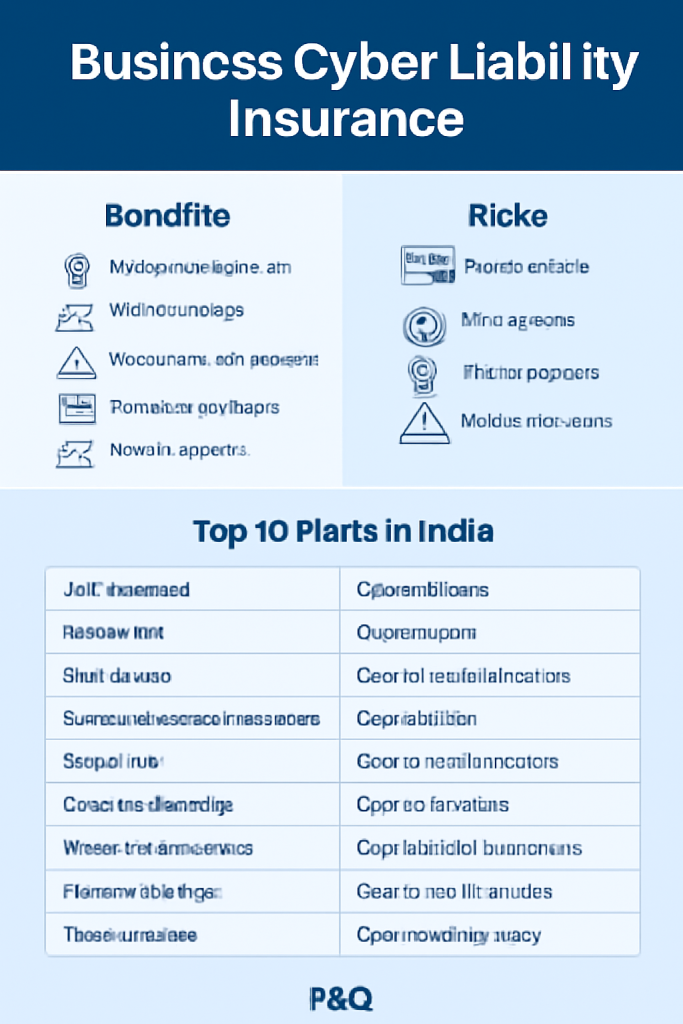
1. What is Business Cyber Liability Insurance?
Business Cyber Liability Insurance is a specialized insurance policy designed to protect businesses against risks related to cyber attacks, data breaches, and other technology-related threats. It covers financial losses and liabilities that arise when sensitive information (like customer data, intellectual property, or financial details) is compromised due to cyber incidents.
2. Benefits of Business Cyber Liability Insurance
- Financial Protection: Covers costs related to data breaches, ransomware attacks, and cyber extortion.
- Legal Coverage: Protects against lawsuits from customers or partners affected by a breach.
- Reputation Management: Covers costs related to PR and customer notification efforts after a breach.
- Business Interruption: Compensates for income lost during system downtime caused by cyber events.
- Expert Support: Access to cybersecurity experts and incident response teams.
- Compliance: Helps meet regulatory requirements for data protection and breach notification.
3. Risks Covered by Business Cyber Liability Insurance
- Data breaches and theft of sensitive information
- Ransomware and malware attacks
- Business interruption from cyber incidents
- Cyber extortion (ransom demands)
- Network damage and loss of data
- Legal claims from third parties due to negligence
- Costs related to notification, credit monitoring, and legal fines
- Social engineering fraud and phishing attacks (depending on policy)
4. Top 10 Business Cyber Liability Insurance Plans in India (2025)
| Insurance Provider | Plan Name | Key Features |
|---|---|---|
| ICICI Lombard | Cyber Safe | Covers data breach, ransomware, legal expenses |
| HDFC ERGO | Cyber Guard | Business interruption, cyber extortion |
| Bajaj Allianz | Cyber Secure | Network security, privacy liability |
| Tata AIG | Cyber Crime Protection | Data loss, breach notification costs |
| Reliance General Insurance | Cyber Shield | Covers phishing, malware attacks |
| Bharti AXA | Cyber Secure Business | Ransomware, cyber fraud, legal defense |
| Oriental Insurance | Cyber Risk Policy | Cyber extortion, forensic costs |
| New India Assurance | Cyber Liability Insurance | Breach costs, network damage |
| Universal Sompo | Cyber Protection Plan | Data breach, system failure |
| Future Generali | Cyber Liability Policy | Cyber extortion, data recovery |
5. Comparison Table of Top 10 Plans in India
| Provider | Pros | Cons |
|---|---|---|
| ICICI Lombard | Comprehensive coverage, strong claim support | Premiums can be higher for small businesses |
| HDFC ERGO | Good for business interruption and ransomware | Limited add-ons for social engineering |
| Bajaj Allianz | Includes privacy liability, flexible sum insured | Claim process can be slow |
| Tata AIG | Extensive data loss and breach notification cover | Some coverage limits may be low |
| Reliance General | Covers phishing and malware attacks | Limited global coverage |
| Bharti AXA | Strong legal defense support | Less coverage for business interruption |
| Oriental Insurance | Forensic cost coverage included | Limited policy customization |
| New India Assurance | Government-backed, reliable | Slower claim settlements |
| Universal Sompo | Affordable premiums, good basic coverage | Fewer add-on features |
| Future Generali | Covers data recovery and extortion | May not cover all types of cyber fraud |
6. FAQ for Business Cyber Liability Insurance
Q1: Who needs Cyber Liability Insurance?
Businesses handling sensitive customer data or operating online should consider it, especially SMEs, IT companies, and e-commerce firms.
Q2: Does it cover insider threats?
Some policies cover insider threats, but it varies by insurer—check specific terms.
Q3: Is cyber insurance mandatory in India?
Not mandatory, but increasingly recommended due to rising cybercrime.
Q4: How much does it cost?
Costs vary based on business size, coverage limits, and industry risk but generally range from ₹15,000 to ₹1,00,000+ annually.
Q5: Does it cover data recovery?
Most plans include data recovery but check if there are limits or exclusions.
Q6: What is not covered?
Usually excludes acts of war, intentional criminal acts by the insured, or outdated security practices.
Q7: How to file a claim?
Notify insurer immediately after a breach or incident. Provide detailed documentation for assessment.
Q8: Can policies be customized?
Yes, many insurers allow add-ons like social engineering fraud or extended business interruption.
Q9: How fast is claim settlement?
Varies by provider; some offer rapid response teams to assist quickly.
Q10: Does it include regulatory fines?
Some policies cover regulatory fines and penalties related to data breaches, but check the policy details.